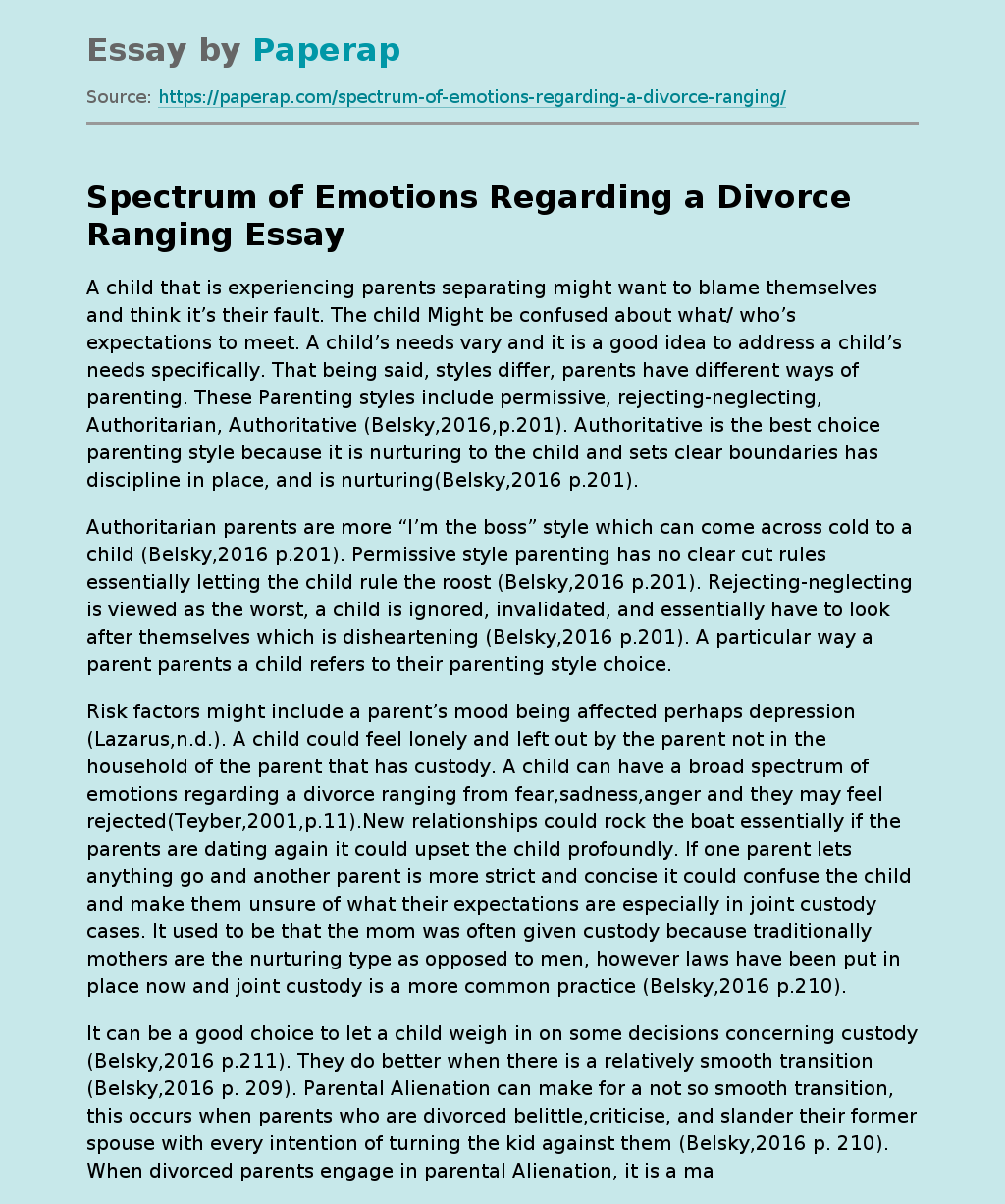Spectrum of Emotions Regarding a Divorce Ranging
A child that is experiencing parents separating might want to blame themselves and think it’s their fault. The child Might be confused about what/ who’s expectations to meet. A child’s needs vary and it is a good idea to address a child’s needs specifically. That being said, styles differ, parents have different ways of parenting. These Parenting styles include permissive, rejecting-neglecting, Authoritarian, Authoritative (Belsky,2016,p.201). Authoritative is the best choice parenting style because it is nurturing to the child and sets clear boundaries has discipline in place, and is nurturing(Belsky,2016 p.
201).
Authoritarian parents are more “I’m the boss” style which can come across cold to a child (Belsky,2016 p.201). Permissive style parenting has no clear cut rules essentially letting the child rule the roost (Belsky,2016 p.201). Rejecting-neglecting is viewed as the worst, a child is ignored, invalidated, and essentially have to look after themselves which is disheartening (Belsky,2016 p.201). A particular way a parent parents a child refers to their parenting style choice.
Risk factors might include a parent’s mood being affected perhaps depression (Lazarus,n.d.). A child could feel lonely and left out by the parent not in the household of the parent that has custody. A child can have a broad spectrum of emotions regarding a divorce ranging from fear,sadness,anger and they may feel rejected(Teyber,2001,p.11).New relationships could rock the boat essentially if the parents are dating again it could upset the child profoundly. If one parent lets anything go and another parent is more strict and concise it could confuse the child and make them unsure of what their expectations are especially in joint custody cases.
It used to be that the mom was often given custody because traditionally mothers are the nurturing type as opposed to men, however laws have been put in place now and joint custody is a more common practice (Belsky,2016 p.210).
It can be a good choice to let a child weigh in on some decisions concerning custody (Belsky,2016 p.211). They do better when there is a relatively smooth transition (Belsky,2016 p. 209). Parental Alienation can make for a not so smooth transition, this occurs when parents who are divorced belittle,criticise, and slander their former spouse with every intention of turning the kid against them (Belsky,2016 p. 210). When divorced parents engage in parental Alienation, it is a malignant outcome for the child.(Belsky,2016,p.211). A large portion of Parenting experts think that staying together when things aren’t working and the parents can’t be civil to one another can only harm a child and in turn set the example for how they will parent when the time comes (Parker,2018).
Although, Other researchers argue just the opposite that parents should stay together at all costs (Parker, 2018). If a child is being abused or maltreated in any sense of the word separation should be considered to protect the child (Parker,2018). Staying together for the kids isn’t appropriate in some instances. Plans to help a child through a divorce might include Starting a journal with the child about their feelings (if old enough), In any case, creating an atmosphere so that the child feels good about approaching you and confiding in you. There are many ways to coax a child and help them emotionally. Kids can pick up the elephant in the room, so it’s best to help the child not feel so bad and help yourself if you are distraught and need help so it’s not a contagion (counseling maybe). Make the child feel important by allowing them to make choices in their lives, even if it’s a simple choice. Help them to understand that it’s not their fault by validating their feelings and listening intently to the child’s needs (each child varies).
Counseling for the child if the divorce was ugly if necessary, It has come to light that my nephew Clayton has Post traumatic Stress disorder from his dad abusing his mom (my sister in law). Abstaining from fights in front of the child, remembering they are little sponges soaking in everything. Encouraging the child to express themselves and not bottle up their emotions would be a big one because it could prove disastrous if the child was a ticking time bomb from pent up feelings not released. I don’t think it could hurt to find a hobby or extracurricular to keep the child focused not to mention it would benefit the child to be a part of a team!
A child needs to feel loved and appreciated, just like we all do! References “Checklist of Protective and Risk Factors for Children of Divorce.” FamilyResource.com, www.familyresource.com/parenting/divorce-and-separation/checklist-of-protective-and-risk-factors-for-children-of-divorce. Parker, Wayne. “How Couples With Kids Can Decide About Divorcing.” Verywell Family, Verywellfamily, www.verywellfamily.com/should-you-stay-together-for-kids-1270800. Belsky, J. (2016). Experiencing the Lifespan (4th ed.). Worth Publishers: New York. Teyber, E. (2001). Helping children cope with divorce. San Francisco: Jossey-Bass.
Spectrum of Emotions Regarding a Divorce Ranging. (2021, Dec 14). Retrieved from https://paperap.com/spectrum-of-emotions-regarding-a-divorce-ranging/

